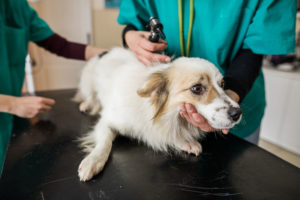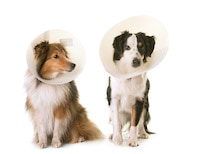 We believe routine examinations are an important part of your pet’s health care.
We recommend all pet owners schedule an exam for their animals at least once a year.
If you have a senior animal or one with a chronic health condition, we recommend at least biannual exams.
We believe routine examinations are an important part of your pet’s health care.
We recommend all pet owners schedule an exam for their animals at least once a year.
If you have a senior animal or one with a chronic health condition, we recommend at least biannual exams. Fecal examinations are recommended on a yearly basis.
Heartworm/Tick borne disease testing is recommended on an annual basis for all dogs starting at 6-12 months of age.
Feline leukemia/Aids recommended at least once for all of our feline friends. We may recommend testing every few years for those kitties that love to play outdoors.
Routine blood work may be recommended for all dogs 5 years and over. We believe all animals over 8 years of age should have annual lab work to pick up on early disease processes as they age.
Fecal examinations are recommended on a yearly basis.
Heartworm/Tick borne disease testing is recommended on an annual basis for all dogs starting at 6-12 months of age.
Feline leukemia/Aids recommended at least once for all of our feline friends. We may recommend testing every few years for those kitties that love to play outdoors.
Routine blood work may be recommended for all dogs 5 years and over. We believe all animals over 8 years of age should have annual lab work to pick up on early disease processes as they age.
Our vaccine schedules are based on American Animal Hospital
Association and the American Association of Feline Practitioners
guidelines.
Rabies is a state law in MA for all dogs, cats, ferrets and horses. The first vaccine is good for a year. Any subsequent vaccine with documented previous rabies vaccine is good for 3 years.
Da2PP (Distemper, Adenovirus, Parainfluenza, Parvovirus) is considered core vaccine. After the initial series of 2-3 vaccines depending on age, the vaccine is boostered after a year then every 3 years thereafter.
Bordetella: Vaccine may be given orally or intranasally once a year. Higher risk dogs may need it every 6 months.
Lyme is given as an initial series of 2 vaccines then boostered yearly.
Leptospirosis is given as an initial series of 2 vaccines then boostered yearly.
Canine influenza is given as an initial series of 2 vaccines then boostered yearly.
Rabies is a state law in MA for all dogs, cats, ferrets and horses. The first vaccine is good for a year. After the first vaccine, you have the option to continue yearly vaccines (Purevax 1 year) or get the Purevax 3 year vaccine. We recommend all cats over 10 years of age get the Purevax 1 year vaccine.
FVR-CP (Feline rhinotracheitis virus, Calici Virus, Panleukopenia virus) is considered a core vaccine. After the initial series of 2-3 based on age, it is boostered after a year then every 3 years thereafter.
Felv (Feline leukemia virus) is given to felines at risk as an initial series of 2 vaccines then boostered yearly.
Puppy and kitten snuggles are very important during the prime socialization period in your animals life. It is also important that your puppy or kitten have a series of examinations to make sure they are growing and socializing appropriately for their age. At their first appointment, we will go over basic information and set up an exam/ vaccine schedule that fits your puppy’s or kitten’s needs.
Future visits will include exams, vaccinations, deworming, and addresses any concerns. Please be sure to bring a stool sample you first visit so it can be examined for intestinal parasites which are really common in puppies and kittens.
As dogs age a bit more quickly than humans, most dogs/cats become seniors between 7 -8 years old depending on size. We believe in early detection in our senior pets so exams every 6 months is recommended in those that appear to be healthy. We may recommend more frequent exams in those with certain diseases.
We also recommend yearly lab work that includes a chemistry (to evaluate internal organs), a complete blood count (evaluates red and white blood cells as well as platelets), total T4 (screening test for thyroid disease) and a urinalysis (provides earlier indications for kidney disease and bladder diseases). In some instances, we may also recommend radiographs.
Our senior pets are also prone to osteoarthritis so we would love to discuss what options are available to help keep your pet moving comfortably for as long as possible.
Laboratory
In house — We maintain an in house diagnostic laboratory for times when we need immediate results.
Send out — We have daily pick up from Antech diagnostic laboratories daily except on Sundays. There is a variety of lab tests available depending on the needs of your pet.
Digital Radiology
We offer digital radiography for times when we need a better look inside your pet. This means we get radiographs much quicker and are better able to share them with a Board-certified radiologist.
Ultrasound
Ultrasound is a great compliment when radiographs do not give us enough information. Ultrasound uses sound waves to give us a bit of a different image of internal organs. It is also great for detecting fluid in the chest or abdomen. Ultrasound is frequently used to help acquire urine directly from the bladder when our pets are too shy to give us a sample or when a sterile sample is indicated.
We recommend spaying or neutering all non-breeding/non-working animals. Age at the time of spay or neuter is recommended based on breed/size of your pet. There are many health benefits to spaying/neutering in addition to decreasing unwanted offspring.
Spaying is recommended to lessen risk of breast cancer, eliminate risk of uterine infections/cancer and prevent signs/side effects from heat
Neutering is recommended to reduce prostate cancer risk, eliminate testicular diseases, and decrease behavior issues such as roaming.
Dental health is important for overall health. Did you know dental disease can also affect liver, kidney and heart health? In cases of advanced periodontal disease, your pet may even be painful. During your pets annual examination, an oral exam will be done to look for signs of periodontal disease. Signs of dental disease include bad breath, drooling, loose, broken or discolored teeth, swelling around the face and even reduced appetite
Dental cleanings: When brushing the teeth at home isn’t enough or periodontal disease is noted on physical exam, a dental cleaning with radiographs may be recommended. A routine dental cleaning includes anesthesia, intravenous fluids, anesthetic monitoring, scaling, polishing, intra-oral exam and intra-oral radiographs.
Dental cleaning with surgical extractions: In some cases surgical extractions of teeth are indicated such as bone loss, loose teeth, infected roots, resorptive lesions, pulpitis and dead teeth. Dental cleaning with surgical extractions includes a dental cleaning in addition to nerve blocks, the surgical extractions, IV antibiotics if indicated and medications to go home.
Pre-Dental Care: We do require that all elective anesthetic procedures have pre-anesthetic lab work. This should be done no later than 2 weeks prior to the dental. There No food after midnight, the night before. Water up until they come in is okay. If your pet is on regular medications, check to see if they should receive that medication the morning of the procedure or not. Drop-off time will either be 8:30am on Tues and Thurs or 8am on Wed.
After Care: Most dentals will go home the same day. Discharge time is usually between 3pm and 6pm. After a dental cleaning with or without extractions, your pet will go home with instructions for after care. All pets will need to be monitored closely at home for 24 hours as they may be groggy from the anesthesia.
Home Care: Once you’re companion has recovered from their procedure, we recommend tooth brushings 3-4 times per week, T/D diet and oral hygiene products that carry the VOHC label.
Estimates: While we do our best to provide an accurate estimate, it is hard to tell how bad the teeth really are sometimes as a lot of dental disease is below the gumline.
Dental referrals may be recommended in certain circumstances such as root canals.
We do perform non-routine surgeries such as mass removals, cystotomies, and other soft tissue procedures.
Chronic condition care
Arthritis Treatment
Anti-inflammatories
Pain medications
Acupuncture/Laser